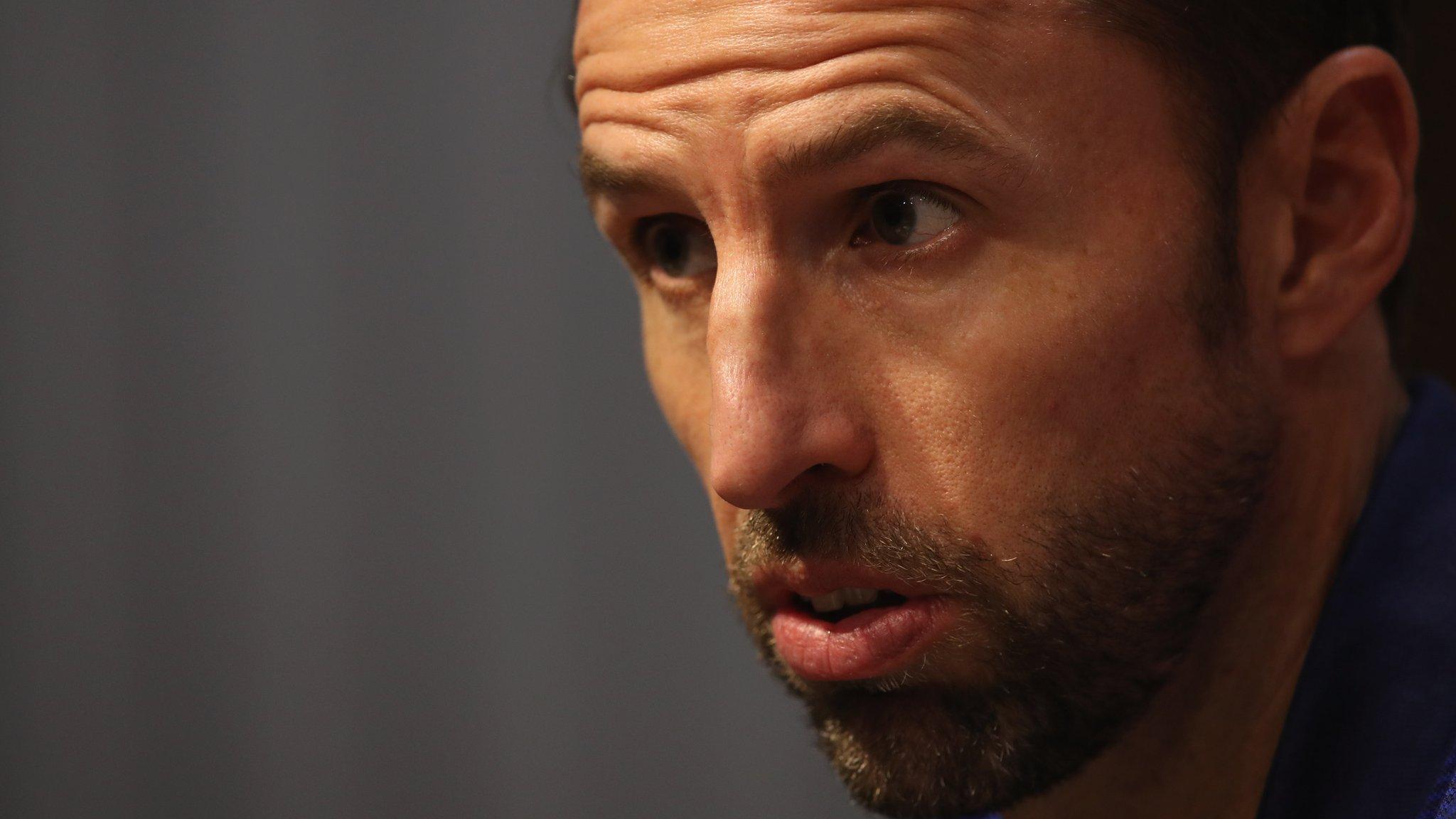World Cup 2022: Can England really target Qatar success?
- Published
- comments
England Under-17s' World Cup win crowned a phenomenal year for the nation's age-group teams in elite tournament football.
Four years ago, England's senior team were given the target of winning the World Cup in 2022 by then Football Association chairman Greg Dyke, who was "laughed at" for the suggestion, according to former international defender Danny Mills.
That aim was later softened to simply being competitive in Qatar, but BBC Sport asks... should it be back on the table?
Here's some factors to consider:
This record...
Four age groups across five tournaments - 34 games played with an 88.2% win percentage and their only defeats on penalties. And a goal difference of +62.
No other nation has won three major youth tournaments in the same calendar year.
Brazil are the only other side to have been under-20 and under-17 world champions in the same year - in 2003.
England v major European rivals at major tournaments in 2017 | |||||
|---|---|---|---|---|---|
England | France | Germany | Italy | Spain | |
Under-17 World Cup | Winners | Round of 16 | Quarter-finals | DNQ | Losing finalists |
Under-17 Euros | Losing finalists (penalties) | Quarter-finals | Semi-finals | Group stages | Winners |
Under-19 Euros | Winners | DNQ | Group stages | DNQ | DNQ |
Under-20 World Cup | Winners | Round of 16 | Round of 16 | Semi-finals | DNQ |
Under-21 Euros | Semi-finals (penalties) | DNQ | Winners | Semi-finals | Losing finalists |
Some of these players...
And others to watch - with England U20s boss Paul Simpson
Mason Mount, 19, Chelsea. Player of the tournament as England U19s won the European Championship in July.
Reiss Nelson, 17, Arsenal.
Jadon Sancho, 17, Borussia Dortmund. Signed from Manchester City for £10m. Only released for the group stage of the U17 World Cup.
Can England realistically target a 2022 World Cup success?
Phil Neville, former England, Manchester United and Everton midfielder: "I think history maybe tells you that if your youth teams are winning World Cups and European Championships then that group of young players can go on and hopefully win the senior equivalent. We have seen it with Germany and Spain in the past decade.
"That has got to be the plan and the aim for these players from the U17s through to the U21s.
"This group of players have tasted success and they know how to win international tournaments. From that point of view, that group of players in 2022 should be able to go and do it."
Jermaine Jenas, former England, Newcastle and Tottenham midfielder: "I think it is better to focus on the fact that all of a sudden now we are creating something different in an England team, we are creating players that are going through experiences as young players that some of the best talent we have had never had the opportunity to go through.
"So things are changing and things are getting better, and I think that is more the focal point for me rather than a clock that says when we want to win a senior tournament by 2022."
England U20s manager Paul Simpson: "The players who won the U20s this summer, in five years' time they may be ready to go to a World Cup. It is still the target. We'd be delighted if we get success in 2018 - but we are looking at 2022.
"We have to change people's perceptions. We want to inspire a nation by being successful. Our country knows that we have good players but the rest of the world doesn't give us the credit we deserve.
"The U20s and the U17s are doing that. You heard people saying that against Brazil [in the U17s semi-final] it was as if the players had swapped shirts. We want to keep that going so next year is the same, and the year after."
Danny Mills, former England defender: "This group of players now - of a mix of five or six years from under-17 to under-21 - well 2022 might be too early. But 2026 - why not? Realistically we've seen that this group of players will mature at that sort of age for the tournament."
Regular club football is key for England youngsters
Jenas: "We can't get carried away. I have played for England teams at U16 and U17 level with players who did not even make it as professional footballers.
"They were at top clubs, Arsenal, Everton, you name it. I would go so far as to say that 50% of the players I played with at England U17 level did not make it as professional footballers.
"You would hope that won't be the case again...but the problem we have got is the Premier League is stronger than it has ever been so getting players into first-team football is going to be difficult, especially when they are 17.
"That is why the Championship, whether in loan moves or permanently, could be the answer for a lot of these players, even the very best ones.
"But it is not just about making sure they have got first-team football. Phil Foden (of the World Cup winning U17 team) could be at Manchester City training with David Silva and Kevin De Bruyne, and going up against Fernandinho every day, so just because he is not playing regularly in the Championship does not mean he is not progressing."
Neville: "There is a pathway in the England set-up now where there is continuity, that they are in the system, but ultimately what happens when they go back to their clubs is the key.
"When those U17 lads go back to their clubs on Tuesday, the success they have had will be celebrated. But come Wednesday morning when they are joining in with their U23 club teams again it will be forgotten about because the hard work actually starts now.
"Someone like Phil Foden looks ready now to play for Manchester City in the Premier League. You can train as much as you like with the first team, but it's all about playing games.
"If he was playing for Brazil, Spain or the Netherlands, we'd be talking about a world-class young player. If he doesn't make it as a Premier League star, we should all pack in. I'd like to see him given his opportunity this season."
Trevor Sinclair, former England midfielder: "It may seem that we are closer to success. But it's the next two or three years of these players' development which is critical. If they are not getting the opportunity to play, it's not likely. If they are then yes, why not?
"They are the best at this age group, they have shown that consistently this year. They are there or thereabouts so why shouldn't the World Cup in 2022 be a realistic goal?"
These players are better prepared than previous generations
Jenas, who played in every England age group: "What we are doing is creating good international footballers - having the pressure of playing in World Cup finals which you don't forget.
"When I look at Steven Gerrard, Frank Lampard, Rio Ferdinand and the rest, I think we lacked that kind of international nous at times which you gain from being in that position all the time.
"That is the biggest difference with these young England players. If the system works the way it should do, when they get to the senior England team they will have been there before and they will be ready.
"The benefit for these young England players is that they are part of a strategy and a structure which was not the case in my day."
Simpson: "We have to celebrate success. It is difficult to balance. You have to keep humility because we have a long way to go. Germany and Spain have done it for a long time and there is nobody at St George's Park or Wembley sitting back in their chair thinking it's job done, I can assure you of that.
"We have a lot of work to do. If it's 2018 or 2022 when we get a senior team successful then fantastic - but then the challenge is to stay there."
Highlights: England win the U20 World Cup
The 'England DNA' and St George's Park
Simpson explained the set-up to BBC Sport:
England elite teams are based at St George's Park in Burton. It cost about £120m to build, is five years old and is overseen by the FA's technical director Dan Ashworth.
"Consistent identity" through all age groups to build from the back, dominate possession with a purpose, to be attacking and have good individual players.
"Incredible" investment into the teams, with 18 staff in South Korea for the U20 World Cup for a squad of 21 players.
Weekly coaches' meetings with England senior manager Gareth Southgate - the first time the approach has been wholly joined up from U15s to senior team
Club academies credited for producing better technical players while keeping traditional English physicality and athleticism
"I don't think this crop is more talented than before," says Simpson. "We have had excellent players come through but there hasn't been the consistency and the chance to get to a major final. Now they are getting those chances.
"We are getting to finals, they have been through penalty shootouts and we hope that experience stands them in good stead for the seniors further down the line."
A look inside St George's Park
But what about the minutes?
The big debate is around game time for young English players - especially in top-flight matches, gaining European experience and breaking into the starting XIs of the 'top six' Premier League clubs.
Last season, England Under-21 squad players played just over 20,000 minutes of top-tier football - 17,000 fewer than their Spanish counterparts. Germany's youngsters played just over 31,000 and Italy's just short of 30,000.
For example, the number of England-qualified players starting in the Premier League this season is 32.4%.
During the October international break, BBC Sport reported that England's Under-21 players are playing less top-flight football this season than their Spanish, German and Italian counterparts - something U21 boss Aidy Boothroyd called a "killer stat".
Under 17s: Eight players have made competitive starts this season, with Fulham's Steven Sessegnon playing three full games in cup competitions and contributing almost half the total minutes played of the entire squad. Only Jadon Sancho - with six Bundesliga minutes for Dortmund - has appeared in a top-flight match.
Under 19s: Most of the minutes played for the U19s squad come in the Championship, League Two and domestic cup competitions. Just 3.4% had been top-flight football.
Under 20s: The England World Cup-winning squad play more football than Italy, who they beat in the semi-finals, but Dominic Calvert-Lewin's Everton appearances made up 62% of the entire squad's total Premier League minutes.
Under 21s: England Under-21 players had played 49% of the total top-flight minutes of their Spanish opponents, 58% of the Germans and 67% of the Italians.
Any other pitfalls?
Trevor Sinclair, former West Ham, Manchester City and QPR winger
"Wealth. They are rewarded so soon. They will be sought-after players, they have produced the goods. Look at Sancho going to Dortmund. That is a dangerous situation that is occurring. We don't want to be losing our best players.
"It may seem we are closer to success - but it's the next two or three years of these players' development which is critical [so] they get that vital experience of dealing with nerves, of dealing with faster, stronger players who think quicker. It's all stuff you need to learn."
- Published28 October 2017
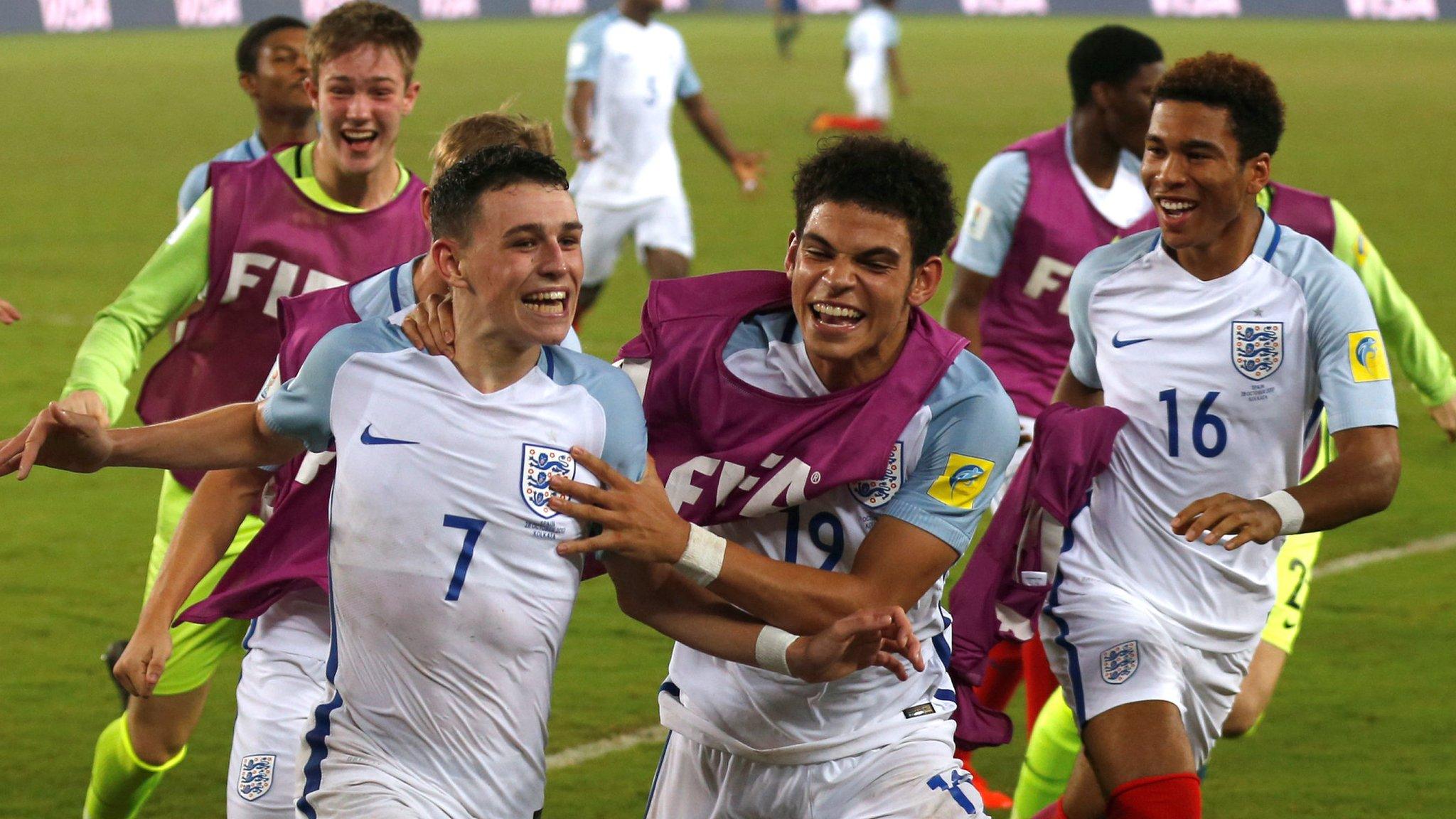
- Published28 October 2017
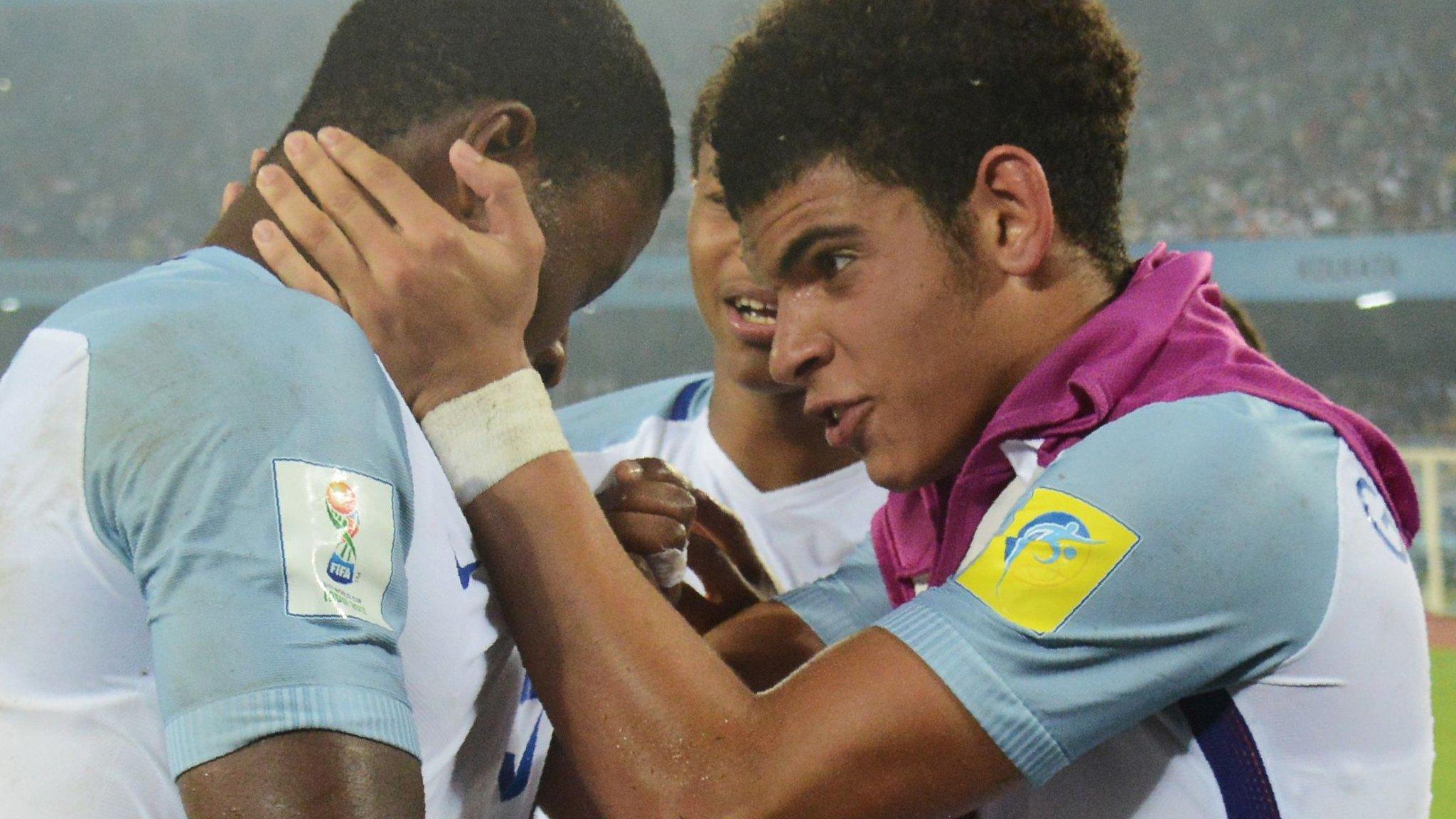
- Published4 October 2017
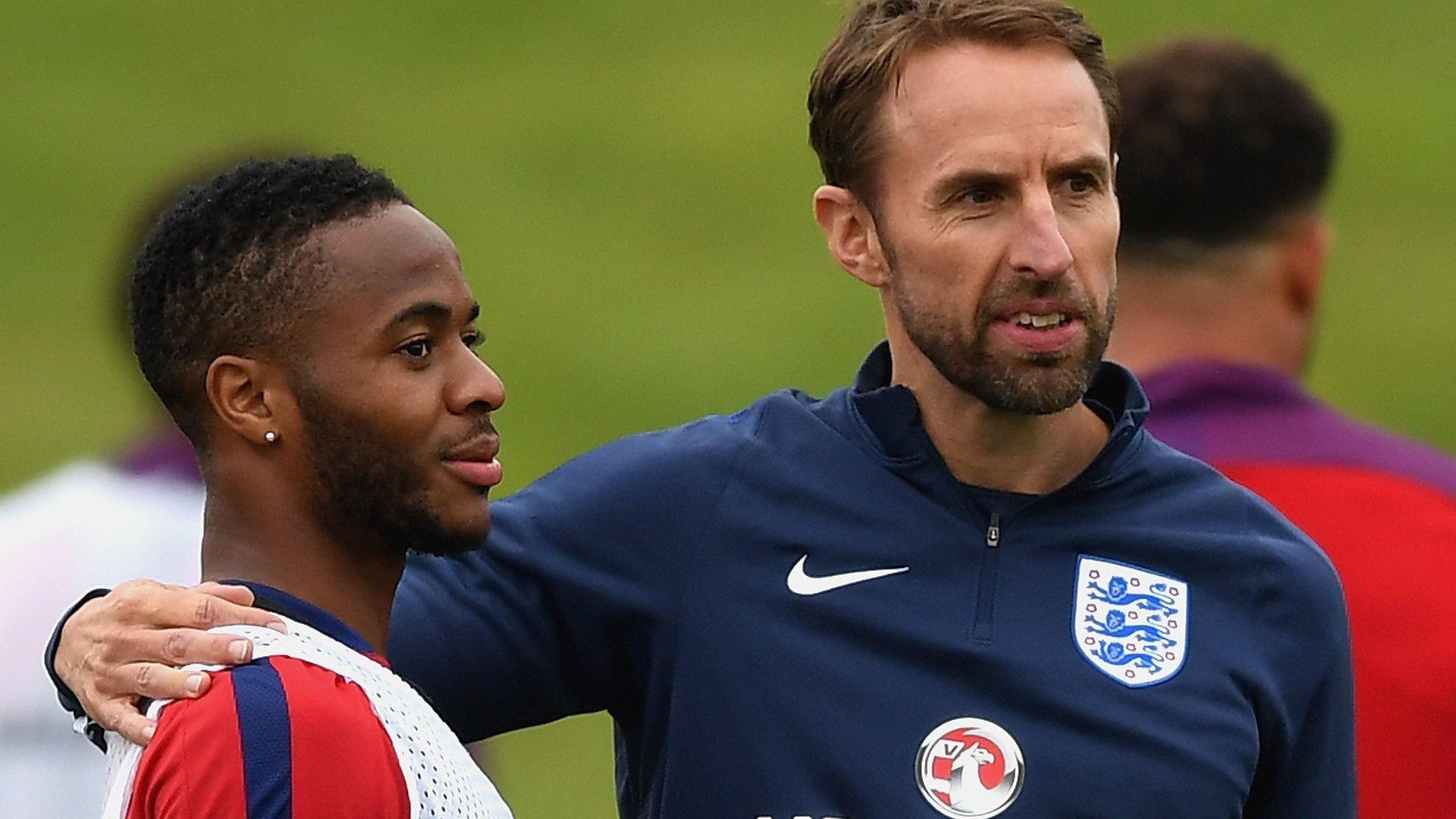
- Published3 October 2017
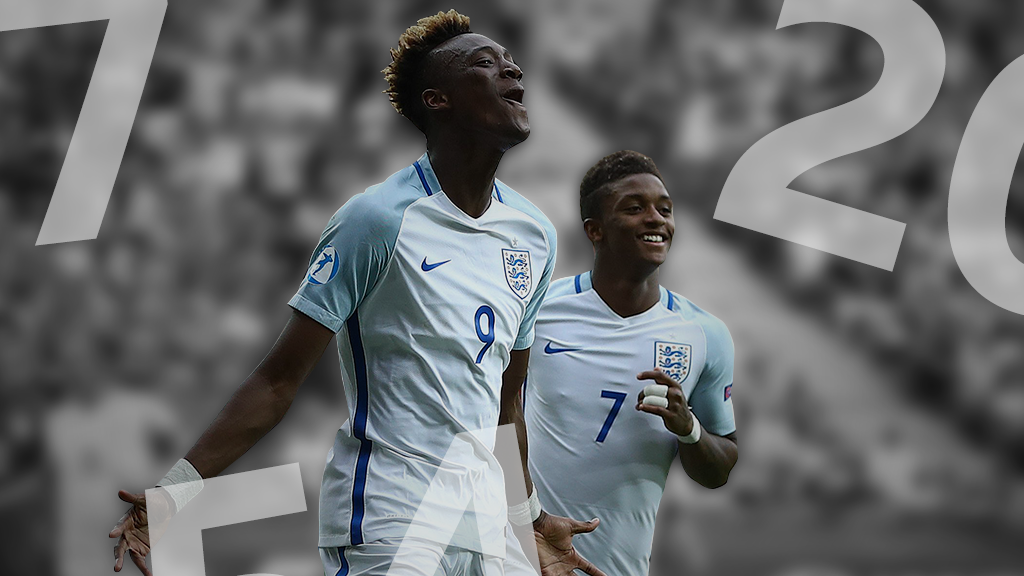
- Published4 October 2017
